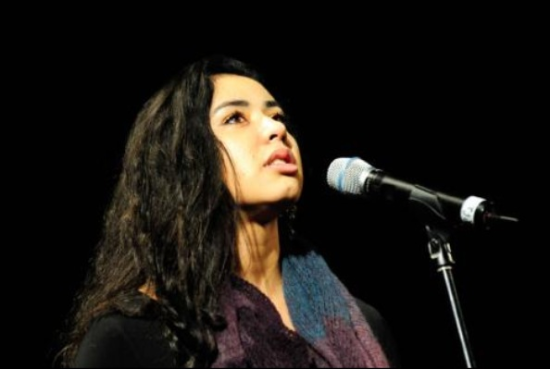Hi! Claire here with a third blog post featuring National Student Poet Natalie from Illinois, who represents the Midwest! For those who are unfamiliar, the President’s Committee on the Arts and the Humanities and the Institute of Museum and Library Services have partnered with the Alliance for Young Artists & Writers to present the National Students Poets Program, the country’s highest honor for youth poets presenting original work. Each year, five National Student Poets are selected through the prestigious Scholastic Art & Writing Awards for a year of service as poetry ambassadors, each representing a different region of the country. This summer, Natalie has featured in and performed at a poetry workshop hosted by Wordplay in Chicago, and will be attending the University of Chicago in the fall.

CL: (Struggles to set up the video chat via Google+ Hangout and starts talking.)
NR: I can’t hear you.
CL: (Face falls and types in the chat box on the side, “I’ll ask you the questions here, and you can respond by speaking.”)
NR: Yay for one-sided conversations!
CL: Part one—general questions. What was the highlight of your year as a National Student Poet?
NR: (Pauses.) Wow, there are literally tons to choose from, but if I had to pick one, it would be meeting the President and the First Lady simply because that was the first time that the gravity of the program really hit me. Up to that point, everything was wonderful, of course. But that particular event, for me, set in stone the weight of this title. I particularly feel so lucky that I get to live in this country where people like the President and the First Lady do something like this to support the arts.
CL: (Beginning to type the second question.) During this past year, what was the biggest obstacle you faced?
NR: I’d have to say that the biggest difficulty was trying to balance the year as a time for personal growth as a writer and challenging others to improve as well. It was hard to strike a clean balance between fulfilling my role as a National Student Poet, my own passion to teach others, and my desire to learn and improve as a writer.
CL: What was one of the biggest lessons that you learned from your role as a National Student Poet?
NR: This role is definitely, without a doubt, so impacting and influential. Sometimes I marvel at how lucky we are—not just the five of us, but all young people in this country, where we have the space and opportunity to write and speak what we want and how we want. It’s so inspiring that adults are creating programs so that the voices of young people can be heard. All of us, the teenagers and young adults, in this country—we really don’t realize or appreciate how lucky and fortunate we are. This past year has helped me realize this, that I should start counting my blessings.
CL: I definitely agree with you. On another note, you also consider yourself blessed to be a part of the slam community. So I’m really curious: how did you first get into spoken word?
NR: There is actually a spoken word club at my school, and it has over 65 members. At the end of my freshman year, a friend of a friend convinced me to attend the club’s spring showcase. It was my first exposure to slam poetry, and I was completely blown away. I’ve tried my best to explore the slam world as much as possible ever since.
CL: As a slam poet, do you see a difference in between just reading a poem and hearing it aloud from a performance standpoint?
NR: Yes, absolutely. Reading aloud a poem breathes an entirely new life into it that simply just wasn’t there before. What attracts me the most is the way slam poetry transforms a poem in such a beautiful way. It completely alters the state of writing that reading doesn’t. Not to mention that it gives the poet much more courage and paves the way for the birth of a community.
CL: So I think it’s safe to assume that slam influences your writing?
NR: Definitely.
CL: How?
NR: I often write with the thought of reading my work aloud. Slam provides a certain musicality, rhythm, sound, tone, and all these amazing things in the progression of words that foster a connection between an audience and the poem. But the slam aspect has definitely influenced me to write more in a traditional method as a storyteller. Most of my poems are like stories in the sense that they have a clear beginning, middle, and end, as well as a main conflict and resolution. I like to think that my poems are easy to understand and relatable on a larger scale. (Smiles awkwardly at the camera, as I’m still responding by typing after NR finishes speaking.)
*
What an extremely insightful interview with National Student Poet Natalie. It was so inspiring to hear about Natalie’s passion for the spoken word—I hope it inspires all of you to look into it and experiment with it as well! I know I definitely see some slam in my future!
xxCL
